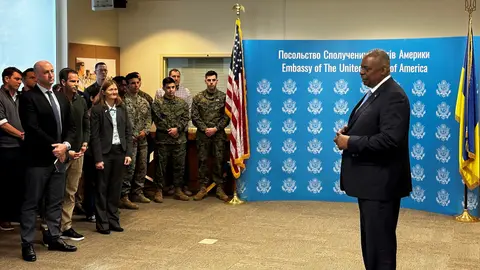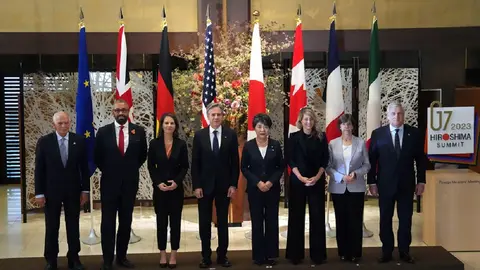Ukraine prepares for second winter of war with snow, cold and mice

Near the eastern front of the Ukrainian war, soldier Dmytro shows a mouse poking its snout out of the hole of its small underground lair where it will spend the winter.
"I don't remember seeing so many mice last winter, this year there are a lot," says the 36-year-old soldier, who is in charge of driving and loading a BM-21 GRAD multiple rocket launcher.
His unit is stationed near Bakhmut, one of the most active fronts in the war after 22 months of Russian invasion.
The shelter, built in a forest and measuring just 20 m2, has bunk beds, a kitchen and a small diesel-powered heater. Electricity is also provided by vehicle batteries.
The temperature in the shelter is around 20 degrees Celsius, compared to around zero outside, with grey skies and damp cold.
And on Sunday night the first snowflakes fell, a sign that winter is here. It will be the second in a row at the front for Dmytro and his comrades.
The first one was rough, but since then they have learned to organise themselves better, especially with the heating system.
Last year, "I froze like a dog, when I came home from the front I put on everything I could, three trousers, a lot of jackets," the soldier recalls.
"We were always ready for battle, we were shooting constantly, all day long. It was very cold," he says.
At the time they had to remain at their post for 24 hours, with no shelter other than muddy or frozen trenches.

Gnawed cables
A year later, Bakhmut fell to the Russians at the cost of a long, bloody battle. The unit changed position and fired less frequently because of the lack of rockets.
They now remain in the heated shelter and protected from bombs or explosive drones. They only fire at specific targets and from a location several hundred metres from their small base.
In the shelter, three dead mice are caught in a trap.
"The problem is that they eat the cables," such as the one that gives access to the internet via the Starlink satellite network, says Volodimir, 45, the unit's commander.
"My wife just bought me this jumper last month, and a mouse has already started eating it," laughs Dmytro.
In addition to the cold and the rodents, winter also means that the trees have no foliage and are useless for hiding from enemy drone cameras.
The roads also become very slippery and vehicles get stuck in the mud.
A few kilometres away, near Bakhmut, Dr Osmak, his military name, is also better prepared for winter.
He runs a centre where wounded soldiers are stabilised, located on the ground floor of a construction building. Several rooms are insulated to keep out the cold.
In addition to a wood-burning cooker, car heaters have also been installed in some rooms.
Last winter, "it was much more difficult to work, because we didn't have time to equip ourselves properly, we were working in the cold," recalls the doctor.
Now in the treatment room there is "a pleasant temperature" of 28, 29 or 30 degrees, he explains. Electricity comes from a large generator outside.










